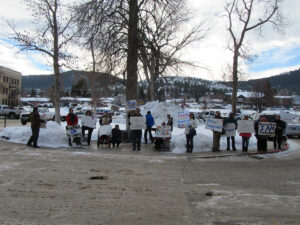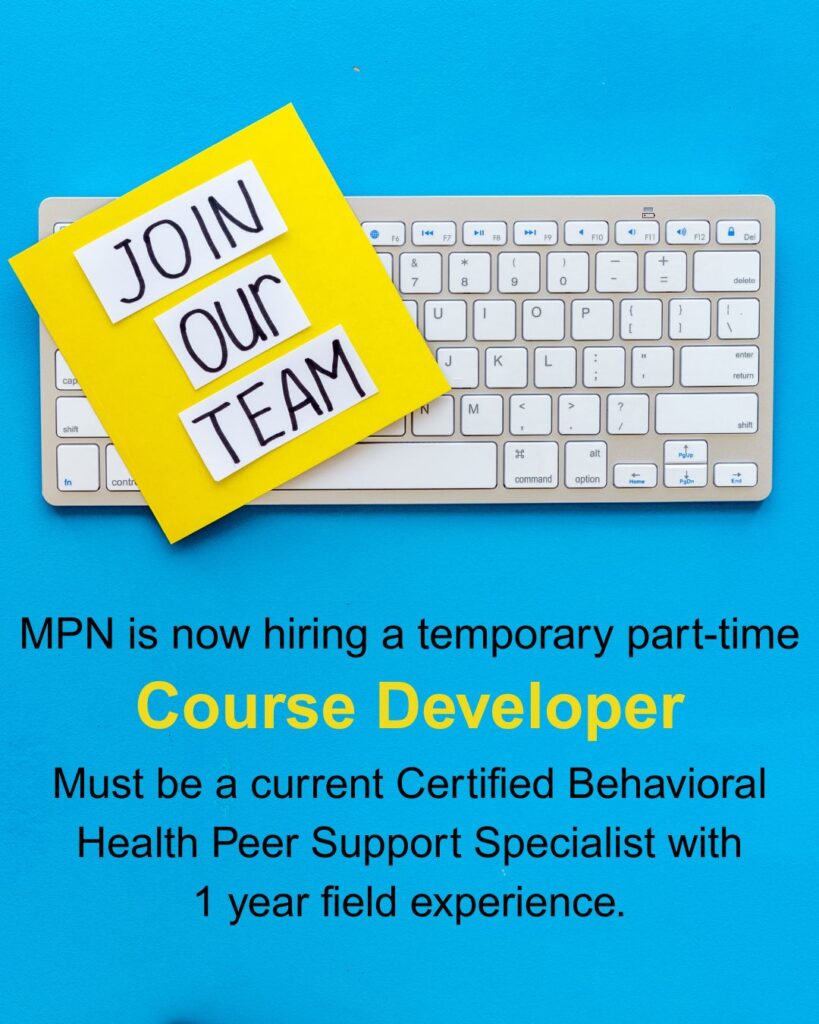We are a network of individuals who are on the path of recovery.
We identify as being in recovery from mental health, substance abuse and or addiction struggles. Together we share information, provide peer support, advocate with a united voice and improve the system. We come from places all across Montana, with different stories and experiences but together we make a difference. This is the Recovery Movement in Montana.



Realizing Recovery Blog
In the Pursuit of Truth
Radical acceptance is like waking up in the middle of a dream and clearly looking at life for the first time. The reality of what I had created while I was asleep in my addiction was startling. The truth that I was unwilling to look at had built momentum, and the consequences of those choices were overwhelming. Recovery demands honesty; every courageous action forward balances authenticity and vulnerability. It meant I could no longer play the victim of life; I needed to be responsible for the life I could create with a willingness to work hard to heal and forgive.
Radical Acceptance Without DBT
We most often hear about radical acceptance in the context of Dialectical Behavior Therapy (DBT) but the concept can be applied with other therapies as well. Part of radical acceptance is acknowledging our thoughts about ourselves even if we aren’t in the right space to challenge those thoughts directly as with DBT or Cognitive Behavioral Therapy (CBT).
Radical Acceptance Opens the Door to Self-acceptance
Radical acceptance comes in moments of clarity, where denial transforms into connection. The test of my commitment to radical acceptance shows up when I try to fix, control, ruminate about the past, predict the future, or avoid pain.
Radical Acceptance
When I think of radical acceptance, I think of when my only brother passed away. I was in Montana’s Women’s Prison and didn’t have a chance to go to his services. It hurt, and I was sober for the first time since I was a teenager. I was sober, but I wouldn’t say I was in recovery, because I was still living in a way that had many, many character defects.
Radical Acceptance – A DBT Distress Tolerance Skill I Still Utilize
I have struggled with mental health challenges and substance use for most of my life. In my early 20’s I was in and out of psychiatric hospitalizations frequently. I felt everything very intensely and my 20’s were filled with misery, agony, and despair. Though I don’t look back on that time of my life fondly, my difficulties opened the door for me to participate in DBT therapy.
Technology and Mental Health
You have probably heard that computers, phones, social media, and other apps are bad for your mental health. That can definitely be an issue as many things in our lives can affect our mental health. In general, too much of just about anything can be problematic. There are various ways in which technology can adversely affect us but there are great things that technology can do for us.
Mental Health: The Most Important Conversation
Mental Health Awareness month, what a beautiful way to bring awareness to a very important topic. Growing up I considered mental health to be very extreme mental health disorders. For example, depression/suicide, substance abuse/addiction, or diagnosis/personality disorders. Also, feeling statements that were commonly heard and used were simply happy, mad, and sad. Mental health is so much more complex than the ones I listed. I now believe those are the extremes, because mental health hasn’t/hadn’t ever been addressed. Navigating something within ourselves, without the knowledge and words, leads to a recipe for disaster.
The Inner Child and My Mental Health Disorder
What people see on the outside is just a hint of what is happening within. Moving through life and feeling the world while my trauma weaves stories about my emotions creates a mental storm legitimized by science as a mental health disorder. Some people call this empathic or highly sensitive, being tuned into what my immediate circle feels and carrying the unspoken weight of our disease. Mental health goes back as far as I could research in my family; it is the generational pattern that has been transferred from mother to child; it manifests as the burning of the internal turmoil in the middle of my life and replaces the peace my heart came here to feel.
Mental Health Awareness Month
May is Mental Health Awareness Month, and as someone who is in recovery from substance use disorder and mental health issues, I am grateful for this opportunity to share my story and help raise awareness about mental health. I live in Billings, Montana, and even here I’ve found that it can be challenging for people in our community to find the resources and support they need to manage these conditions. That’s why I feel it’s essential to talk openly about mental health to help reduce stigma and encourage people to seek help when they need it.
A Journey to Wellness
I recently learned about the 8 Dimensions of Wellness. Before I dive into these, I first want to define what “wellness” means. Wellness is the “act of practicing healthy habits on a daily basis to attain better physical and mental health outcomes.1” For many people, wellness is associated with physical health, but not necessarily with mental health. I know that was true for me for much of my life. By taking stock of different areas of my life and consciously making a plan for how to improve these various aspects, I can increase my quality of life. I am just starting this journey myself and have a ways to go, but I believe with guidance from these dimensions, I can make some improvements in myself.
Advocacy
Check out our new page dedicated to tracking state and federal bills, executive orders, and lawsuits.
 Standing up for what we believe is right, having a voice, making choices in recovery, and sharing our own recovery story are some of the things that make up advocacy and self-advocacy.
Standing up for what we believe is right, having a voice, making choices in recovery, and sharing our own recovery story are some of the things that make up advocacy and self-advocacy.
Let’s start with self-advocacy which refers to an individual’s ability to effectively communicate, convey, negotiate, or assert his/her own interests, desires, needs, or rights. It involves making informed decisions and taking responsibility for those decisions (Van Reusen et al., 1994).
Knowing yourself and your strengths, needs, and interests is the first step toward advocating for your rights. Once we begin to find our way on the path of recovery, we may want to begin to advocate for ourselves with those around us—peer supporters, friends, family, service providers, and doctors. These conversations may be difficult, but having them is vital to your recovery. Remember, you are the expert on yourself.
It may be that prior to getting on the path to recovery, others were making decisions for you or acting in what they believed to be your best interest. Now may be the time for you to let others know what you believe to be in your best interest. You may find yourself in the process of taking control and making decisions affecting your life and perhaps others’ lives. This process of self-determination means making informed choices, problem solving, setting and attaining goals—essentially being a self-advocate.
Advocacy or advocating for others may be something you are interested in doing. Advocating for another person isn’t about acting in a person’s perceived best interest, but it is standing with a person to ensure they are able to articulate and obtain what they want or need. Perhaps you may consider speaking up and advocating for various changes in the services in your community.
Here are a few examples of advocacy:
- Speak to your legislature or a special committee.
- Get involved with an advocacy group or organization.
- Share your recovery story to support others in recovery.
- Whether advocating for yourself, for others, for your community, or as part of an organization, advocacy is very self-empowering. You can make a real difference in your life, the lives of others, and even the community.
- Reach out to Montana’s Peer Network and share your recovery story on one of our “Recovery Talks” podcasts.
Advancing Advocacy Blog
Recovery Month 2024
Every September, the Substance Abuse and Mental Health Services Administration (SAMHSA) leads the nation in celebrating Recovery Month, a time dedicated to promoting awareness and understanding of mental health and substance use disorders, celebrating those in recovery, and highlighting the effective treatments available. Recovery Month has been a vital part of SAMHSA’s efforts to combat the stigma associated with mental health and substance use disorders, and in 2024, the initiative continues with renewed energy and focus on the theme, “Hope, Healing, and Health.”
Homelessness is Now a Crime?
About a month ago the US Supreme Court ruled communities can cite and fine homeless individuals for sleeping outside. This ruling empowers city and county commissioners in Montana to implement a ban on sleeping outside such as in a tent, in a park or on the street. The ruling was 6-3 so it was not unanimous. This ruling overturns the 9th Circuit Court which rules over the following states, Alaska, Arizona, California, Hawaii, Idaho, Montana, Nevada, Oregon and Washington. All these states all have high housing prices, a lack of services and tend to lean towards anti homelessness. In Montana we have seen a number of communities such as Kalispell and Lewistown become very vocal when nonprofits have attempted to implement services or temporary shelters for homeless individuals, with a, “Not in my town!” attitude. This of course begs the question. If not in your town, then where? Where exactly should individuals go if they cannot afford housing? This is a complex issue for sure. It seems to me that our leaders lack insight into that complexity. We can’t just move people down the road. The road only leads to another town. Where is issue starts all over again.




